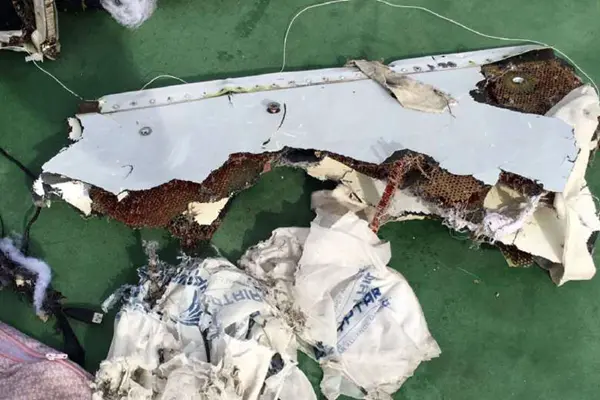Traces of explosives have been detected on the remains of victims of an EgyptAir plane crash in May that killed all 66 people on board, the Egyptian aviation ministry has said.
An official investigative committee which made the discovery has referred the case to Egypt's state prosecution, it added in a statement yesterday.
Under Egyptian law, the prosecution takes over "if it becomes clear to the investigative committee that there is criminal suspicion behind the accident", the ministry said.
The criminal investigation is likely to explore the possibility of a bomb being planted on board, The Independent reported.
The Airbus A320 had been en route to Cairo from Paris when a fire broke out and the plane crashed into the eastern Mediterranean, investigators had previously said.
Among the 66 people on board were 40 Egyptians, including the 10-member crew, and 15 French nationals.
French investigators have said that they had found trace levels of the explosive material, TNT, on the plane's debris but were prevented from further examining it, according to a report in Paris daily Le Figaro. Egyptian officials denied that.
Earlier, Egyptian officials said evidence showed that EgyptAir Flight 804 most likely broke up in midair after a fire near or inside the cockpit quickly overwhelmed the crew.
But the officials could not determine whether the fire, thought to have caused the crash, had been set off by a mechanical malfunction or a malicious act.
The findings are based on information from the plane's flight data recorder and cockpit voice recorder, commonly known as black boxes, along with an analysis of the condition and distribution of recovered debris, including human remains, according to forensic and aviation officials in Cairo.
An Egyptian aviation official said the voice recorder from the cockpit indicated that the mood there was relaxed in the minutes before the plane veered off course.
Crew members were playing music and chatting when the pilot, Captain Muhammad Shoukair, 36, suddenly said there was a fire on board and asked co-pilot Muhammad Mamdouh Assem, 24, to get an extinguisher.
That was the last human sound the recorder captured. Information from the flight data recorder, as well as a series of automated alerts that were sent by the plane to a maintenance base on the ground, suggests that, in the minutes before radar contact was lost, heavy smoke was detected in a lavatory as well as near the cockpit. The source of the fire remains unclear.
Egypt's aviation minister had said that a terrorist attack was the most likely cause of the crash. No group has claimed responsibility for the incident.
(THE STRAITS TIMES)
 简体中文
简体中文

